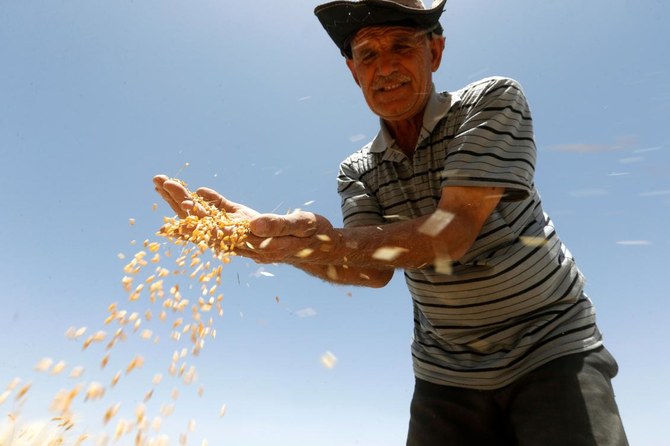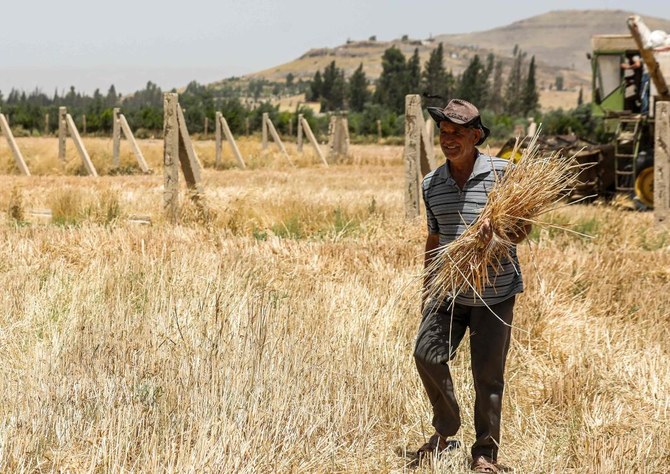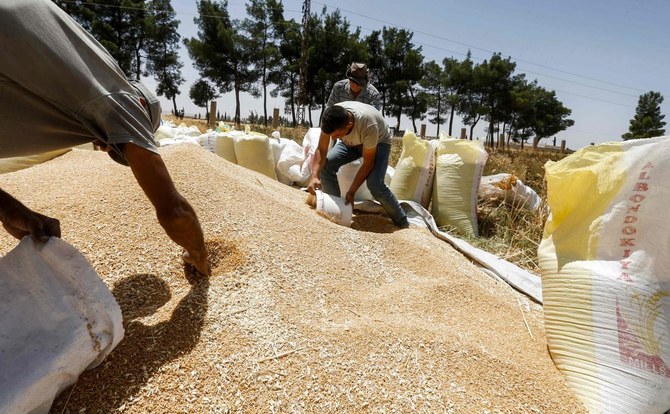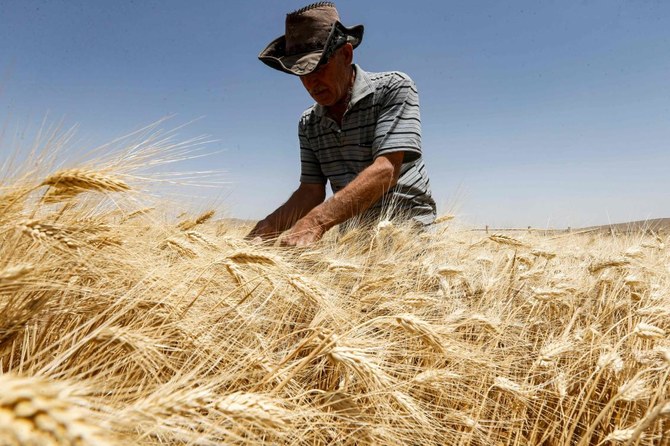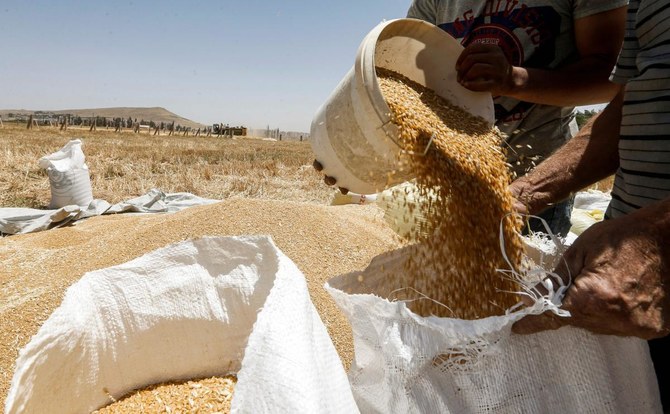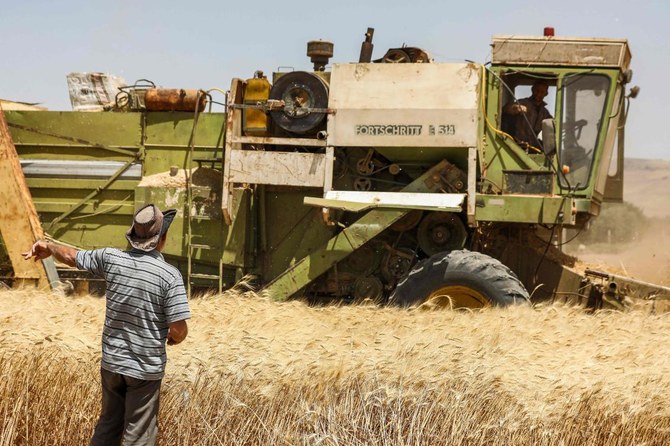DAMASCUS: Watching a combine harvester grind through his golden wheat, farmer Yahya Mahmoud is relieved the yield looks good this year, even as a tanking economy leaves millions hungry across war-torn Syria.
Before the war erupted in 2011, Syria produced enough wheat to feed its entire population but harvests then plunged to record lows, boosting reliance on imports, mainly from regime ally Russia.
Heavy rains and reduced violence in parts of the country this year have led to a much improved harvest, one that farmers and officials hope will soften the blow of an economic crunch that has plunged millions into food insecurity.
In the Al-Kaswa region near the capital Damascus, Mahmoud eyed yellow wheat stalks, their ribbed tips shining under the strong June sun.
“I rushed to harvest my wheat crop this year... to feed myself and my family,” said the 61-year-old farmer, fearing crop fires as summer temperatures soar.
“Those who grow wheat don’t go hungry,” he added, a brown hat covering his head.
More than nine years into a conflict that has killed over 380,000 people and displaced nearly half of the country’s pre-war population, a staggering 9.3 million Syrians face food insecurity, the United Nations says.
The value of the Syrian pound has reached unprecedented lows against the dollar on the black market, sending prices soaring in a country where the UN says nine out of 10 people now live in poverty.
The crisis has been compounded by a COVID-19 outbreak and new US sanctions against Syria.
In a bid to ease the crisis, many are looking toward the agriculture sector, which the UN says forms the largest part of the Syrian economy and contributes to the livelihoods of millions in rural areas.
Farmers across the country this year were able to use 70 percent of the land allocated for cereal production, according to the UN’s Food and Agriculture Organization.
Mahmoud cultivated four hectares (almost 10 acres) of land with wheat instead of one in previous years, he told AFP.
“It was a blessed year, with plentiful rain, so we had to make use of it,” said the farmer, who returned to his plot two years ago after the government recaptured areas around Damascus from rebels.
Inspecting fields nearby, Hisham Al-Sayyad, a local agricultural official, said farmers in Al-Kaswa have cultivated 3,000 hectares of land this year, which is 1,000 more than the year before.
“Syria is an agricultural country,” said Sayyad.
“Despite sanctions and an economic siege, agriculture can help us achieve self-sufficiency.”
Bigger harvests alone do not guarantee better lives for Syrians, however.
Price hikes fueled by the Syrian pound’s tumble have made it more costly for farmers to purchase water, pesticides, seeds and fuel.
Imports of key agricultural equipment has become very expensive, said Taleb Khalifa, a 51-year-old crop grower.
“We are facing a serious challenge,” he said, inspecting the engine of a combine harvester.
To make matters worse, fresh US sanctions came into force mid-June, exposing anyone doing business with President Bashar Assad’s government to travel restrictions and financial penalties.
This has spurred fears that foreign companies may be liable if they do business in government-held parts of the country.
Khalifa’s combine is the only functional one in all of Al-Kaswa and is used to harvest several plots.
He feared US sanctions could hamper the import of spare parts if it broke down.
“The sanctions, in general, are adding to our woes.”
Earlier in June, Foreign Minister Walid Muallem said Syrians should wean themselves off imports and rely on local products to combat the effects of sanctions.
Haytham Haydar, the director of agricultural planning in the Syrian government, echoed this view.
“We hope to return to large pre-war production levels” of wheat, which stood at around 4.1 million tons, he said from his Damascus office.
He said wheat production this year reached 3 million tons, up from around 2.2 million tons last year.
Haydar acknowledged “rising production costs” but blamed it solely on Western sanctions he described as a “war” on food security.
He said the “economic blockade” on Syria would only boost agricultural production.
“Syrians will rely on their own production capacities to weaken reliance on imports as much as possible,” he said.
Syria harvest boom brings hope as hunger spikes
https://arab.news/2e5ha
Syria harvest boom brings hope as hunger spikes

- More than nine years into a conflict that has killed over 380,000 people and displaced nearly half of the country’s pre-war population, a staggering 9.3 million Syrians face food insecurity
- The crisis has been compounded by a COVID-19 outbreak and new US sanctions against Syria
US believes Israel, Lebanon have agreed terms to end Israel-Hezbollah conflict

Israel’s government on Monday said it was moving toward a ceasefire in the war with Hezbollah but there were still outstanding issues.
Arrest Warrant: UK would follow ‘due process’ if Netanyahu were to visit – foreign minister

- ICC issued arrest warrants on Thursday against Israeli PM Benjamin Netanyahu
- Several EU states have said they will meet commitments under the statute if needed
FIUGGI: Britain would follow due process if Benjamin Netanyahu visited the UK, foreign minister David Lammy said on Monday, when asked if London would fulfil the International Criminal Court’s arrest warrant against the Israeli prime minister.
“We are signatories to the Rome Statute, we have always been committed to our obligations under international law and international humanitarian law,” Lammy told reporters at a G7 meeting in Italy.
“Of course, if there were to be such a visit to the UK, there would be a court process and due process would be followed in relation to those issues.”
The ICC issued the warrants on Thursday against Israeli Prime Minister Benjamin Netanyahu, his former defense minister Yoav Gallant, and Hamas leader Ibrahim Al-Masri for alleged crimes against humanity.
Several EU states have said they will meet their commitments under the statute if needed, but Hungarian Prime Minister Viktor Orban has invited Netanyahu to visit his country, assuring him he would face no risks if he did so.
“The states that signed the Rome convention must implement the court’s decision. It’s not optional,” Josep Borrell, the EU’s top diplomat, said during a visit to Cyprus for a workshop of Israeli and Palestinian peace activists.
Those same obligations were also binding on countries aspiring to join the EU, he said.
Turkiye man kills seven before taking his own life

Istanbul: A 33-year-old Turkish man shot dead seven people in Istanbul on Sunday, including his parents, his wife and his 10-year-old son, before taking his own life, the authorities reported on Monday.
The man, who was found dead in his car shortly after the shooting, is also accused of wounding two other family members, one of them seriously, the Istanbul governor’s office said in a statement.
The authorities, who had put the death toll at four on Sunday evening, announced on Monday the discovery near a lake on Istanbul’s European shore of the bodies of the killer’s wife and son, as well as the lifeless body of his mother-in-law.
According to the Small Arms Survey (SAS), a Swiss research program, over 13.2 million firearms are in circulation in Turkiye, most of them illegally, for a population of around 85 million.
2 Palestinians killed in Israeli raid in West Bank: PA

- The official Palestinian news agency Wafa said Israeli forces entered the village on Sunday night
Yabad: The Palestinian Authority said two Palestinians, including a teenage boy, were killed during an Israeli raid in the occupied West Bank village of Yabad.
The official Palestinian news agency Wafa said Israeli forces entered the village on Sunday night, leading to clashes during which soldiers shot dead two Palestinians.
The two dead were identified by the Palestinian health ministry as Muhammad Rabie Hamarsheh, 13, and Ahmad Mahmud Zaid, 20.
“Overnight, during an IDF (Israeli army) counterterrorism activity in the area of Yabad, two terrorists hurled explosives at IDF soldiers. The soldiers responded with fire and hits were identified,” an Israeli military source told AFP.
Last week, the Israeli army launched several raids in the West Bank city of Jenin, killing nine people, most of them Palestinian militants.
Violence in the West Bank has soared since the war in Gaza erupted on October 7 last year after Hamas’s attack on Israel.
Israeli troops or settlers have killed at least 777 Palestinians in the West Bank since the start of the Gaza war, according to the Ramallah-based health ministry.
Palestinian attacks on Israelis have also killed at least 24 people in the West Bank in the same period, according to Israeli official figures.
Israel has occupied the West Bank since 1967.
Israel says hit Hezbollah command center in deadly weekend strike

- The strike hit a residential building in the heart of Beirut before dawn Saturday
- Since September 23, Israel has intensified its Lebanon air campaign
JERUSALEM: The Israeli army on Monday said it had struck a Hezbollah command center in the downtown Beirut neighborhood of Basta in a deadly air strike at the weekend.
“The IDF (Israeli military) struck a Hezbollah command center,” the army said regarding the strike that the Lebanese health ministry said killed 29 people and wounded 67 on Saturday.
The strike hit a residential building in the heart of Beirut before dawn Saturday, leaving a large crater, AFP journalists at the scene reported.
A senior Lebanese security source said that “a high-ranking Hezbollah officer was targeted” in the strike, without confirming whether or not the official had been killed.
Hezbollah official Amin Cherri said no leader of the Lebanese movement was targeted in Basta.
Since September 23, Israel has intensified its Lebanon air campaign, later sending in ground troops against Hezbollah in southern Lebanon.
The war followed nearly a year of limited exchanges of fire initiated by Hezbollah in support of its ally Hamas after the Palestinian group’s October 7, 2023 attack on Israel, which sparked the Gaza war.
The conflict has killed at least 3,754 people in Lebanon since October 2023, according to the health ministry, most of them since September this year.
On the Israeli side, authorities say at least 82 soldiers and 47 civilians have been killed.




